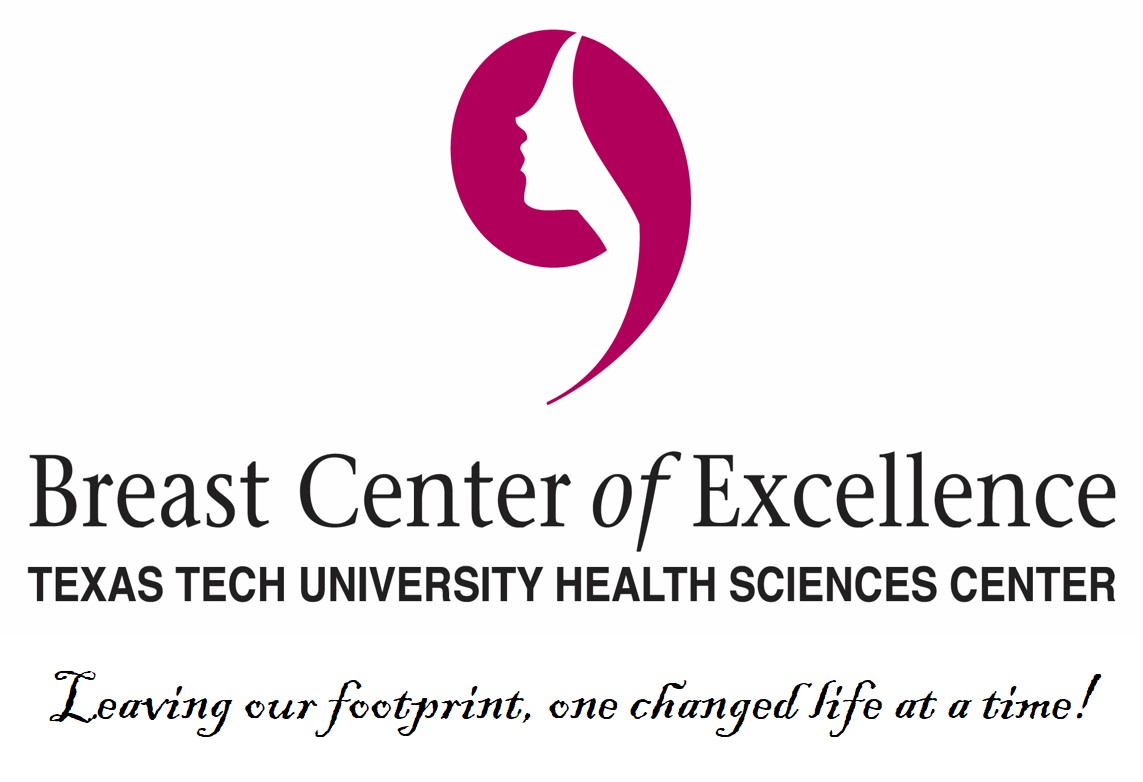Southwest Cancer Center Breast Center of Excellence

OUR VISION
To be known for excellence in teaching, patient care, and scientific contributions that enhance the breast health care of communities in the region
OUR MISSION
The Southwest Cancer Center – Breast Center of Excellence multidisciplinary team ensures that the West Texas and surrounding communities receive the very best in breast care, today and tomorrow. We provide the most current breast health care programs available today; we train future doctors and participate in research impacting breast health care tomorrow. We leave our footprint, one changed life at a time.
PROGRAM OVERVIEW
The SWCC-BCE presents a comprehensive program for breast health that is offered to the population of the Texas South Plains and the extended catchment area. This program targets all-inclusive breast care including, but not limited to, risk assessment and counseling, the management of benign disease and the multidisciplinary management of breast cancer and survivorship.
The strategic alliances between entities listed above share a common goal to obtain and maintain the National Accreditation Program for Breast Centers (NAPBC) accreditation, and to achieve a National Quality Measures Breast Center of Excellence (NQMBC) which allows the SWCC-BCE to achieve:
- A model for organizing and managing a breast care program to ensure multidisciplinary, integrated and comprehensive breast care services.
- Internal and external assessment of breast care program performance based on recognized standards to demonstrate a commitment to quality care.
- Recognition for having met performance measures for high-quality breast care established by national health care organizations.
- Participation in the National Breast Disease Database to report patterns of care and to impact quality improvement.
- Access to breast care comparison benchmark reports containing national aggregate data and individual center data to define patterns of care and outcomes relative to national norms.
- National recognition and public promotion.
INTRODUCTION
Historically, the evaluation and management of patients with breast disease, and/or concerns regarding the risk for breast disease, have been fragmented among various disciplines. More importantly, some aspects of evaluation and management, such as psycho-social care, have often been ignored. The concept of comprehensive breast care was born in the 1970’s, coinciding with the change of the health care delivery system from a discipline-based to a specialty-based approach. The last four decades have seen the evolution and proliferation of breast centers across the United States to provide comprehensive services to the over 200,000 women diagnosed with breast cancer every year. Some of these centers focus exclusively on cancer care, but it has been determined that a "comprehensive care center" must include and provide for the approximately one million women with benign breast disease, and more importantly, the healthy women who themselves present with a high risk for developing breast cancer. This translates into a need for the availability of a myriad of services that must be provided by a "comprehensive breast center".
West Texas represents a unique challenge for delivery of comprehensive breast health care delivery programs by virtue of geographic distances combined with largely medically underserved communities facing ethnic (specifically Hispanic), socio-economic and cultural barriers that compromise access to healthcare, which reduces mammographic screening thereby leading to late stage at diagnosis, and lack of continuum of care across the spectrum of breast health.
To meet this important need for a "comprehensive breast care center", TTUHSC has established an overarching portfolio for the SWCC-BCE to provide a state-of-the-art breast care program in the Texas Panhandle region. This effort began in 2010, and as of 2016 the center has provided comprehensive care to hundreds of women in the region with prospective reporting of quality measures through an alliance between:
- Texas Tech University Health Sciences Center, a public institution of higher education In the state of Texas, on behalf of its School of Medicine (TTUHSC); and
- University Medical Center; a public, non-profit hospital licensed in Texas and owned by the taxpayers of Lubbock County, Texas. UMC is the primary teaching hospital for the Texas Tech University Health Sciences Center.
Students need to know that we truly care about them and want them to succeed. Their
successes make us, as faculty, very proud!
Wade Redman, Ph.D., MBA, MT (ASCP)
Department Chair Laboratory Sciences and Primary Care
Got Questions?
We're here to help. Contact us if you have questions.
